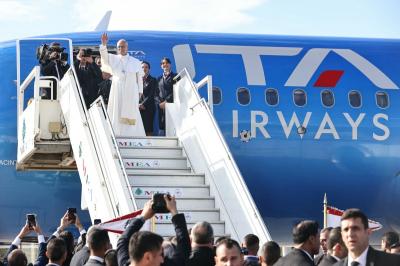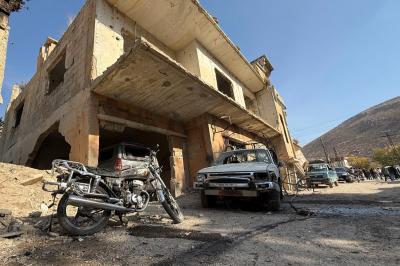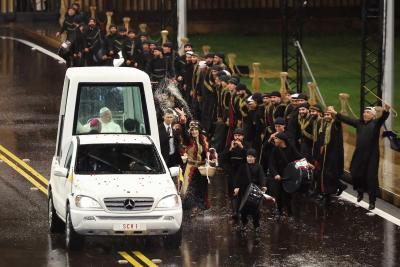Palestinian President Mahmoud Abbas has visited Lebanon for the second time — the first was eight years ago. Back then, his discussions with President Michel Aoun centered on the situation of Palestinian refugees in camps, bilateral relations between Palestine and Lebanon, and the issue of Palestinian weapons both inside and outside the camps.
This time, Abbas met with President Joseph Aoun to discuss the very same topics.
Eight years ago, that visit culminated in a mutual affirmation: weapons must be confined to the Lebanese state alone, any armed presence outside the authority of the state must end, and a joint Lebanese-Palestinian committee would be formed to create a mechanism for handing over Palestinian weapons within the camps to Lebanese authorities. The agreement emphasized Lebanon’s sovereignty and the need to coordinate with the Lebanese state in regulating weapons inside the camps, all while acknowledging that some factions operate independently of Abbas’ authority.
What stands out today is that the outcomes of this new visit mirror those of 2017. Abbas once again promised Lebanon it had every right to impose its sovereignty over the camps and collect weapons — the timing, he said, was Lebanon’s decision. In essence, the tone remained diplomatic, even ceremonial. The real issue lies in what the international community expects of Lebanon: to implement UN Resolution 1559, which calls for the disarmament of all militias, including Hezbollah and Palestinian factions.
Lebanon is now under mounting pressure to disarm Palestinian groups — or face consequences, including an ultimatum to expel them within an agreed timeframe. The Lebanese government seems poised to take such steps, potentially sparking a crisis centered on the camps’ weapons — a confrontation that may already be in motion.
Yet disarming factions that do not recognize the Palestinian Authority (PA) is no easy task. These groups operate outside Abbas’ command. So did Abbas miscalculate by publicly discussing weapons in the camps — believing the moment was ripe to reassert PA control, especially as Hamas reels from its challenges in Gaza?
In truth, Hamas does not outright reject PA involvement in the camps, but insists that any dialogue must not be exclusive to the PA. As a key player, Hamas demands to be included in discussions regarding the fate of the camp's weapons.
Indeed, Hamas, following the siege and devastation in Gaza, may now view its presence and arsenal in the Lebanese camps as a strategic alternative to Gaza. When Yasser Arafat was in exile and had no foothold inside Palestine, the camps and their weaponry were his only source of influence. Hamas seems to be thinking along similar lines.
Some Lebanese politicians have downplayed Abbas’ commitments, pointing out that he holds no sway over the armed factions in the camps, especially Hamas, which is aligned with the so-called “Resistance Axis” and cannot unilaterally decide to disarm.
Abbas’ visit was also met with disapproval from certain factions tied to that axis. These groups criticized the timing, coinciding with the Arab League summit and Donald Trump’s visit to Saudi Arabia, as well as Lebanon’s precarious circumstances. They questioned why Abbas would pledge to disarm while Gaza faces what they call an extermination campaign.
Abbas seems to be seizing a moment to reassert influence in both Gaza and the camps, ahead of expected negotiations over Gaza’s future. The visit, by some accounts, was backed by Egypt, which is eager to see Abbas play a renewed role as Hamas loses strength.
Still, Abbas’ promises — and the green light he gave Lebanon to enforce authority in the camps — are unlikely to translate into concrete action. Instead, the Lebanese state appears to be offering up the “Palestinian weapons file” to the international community, hoping this will deflect pressure over Hezbollah’s arms. The message to Hezbollah is clear: the state is serious about disarmament and expects the same in return.
Despite the diplomatic and political success of Abbas’ visit, its impact will likely fade the moment he departs, having made pledges he cannot enforce, in areas fragmented among multiple Palestinian factions. Most of these groups have gained little from Hamas’ “Al-Aqsa Flood” operation, nor from the ongoing suffering in Gaza.
Finally, Abbas’ repeated declarations that all Palestinians must respect Lebanon’s sovereignty and laws, and that no military action may be launched from Lebanese soil except by the Lebanese Army, directly challenge the narrative long used by “resistance” groups — both Lebanese and Palestinian — to justify their continued illegal armament. These weapons, often wielded for internal political goals within Lebanon, Palestine, or the broader Arab world, are now exposed for what they are.
Has anyone noticed that May 2025 is not like back in 2017?
Please post your comments on:
comment@alsafanews.com
 Politics
Politics













